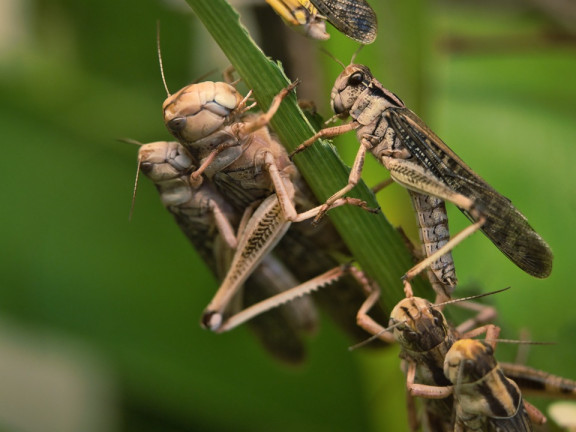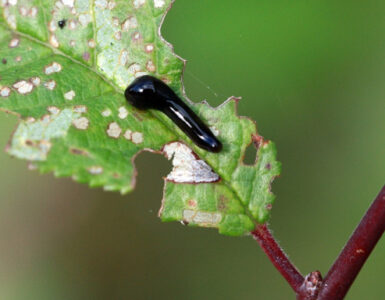Locusts (especially desert locusts) are one of the most destructive pests that a gardener or farmer can face [1].
Swarms of these insects can cause severe damage to plants. Fortunately, there are many natural ways to manage and control them.
Identification
Locusts are a type of short-horned grasshopper. When conditions are right, they can form large swarms that can travel long distances [2].
These swarms can devastate crops and pastures, leading to severe agricultural losses.
Locusts attack a wide range of plants, including grains such as corn, wheat, and rice, as well as potatoes and grasses.
They may also go after beans, lettuce, carrots, cabbage, and other vegetables. Fruit trees and flowering plants are also at risk.
How to Get Rid of Locusts Naturally
Below are some home remedies and natural solutions to help get rid of locusts in your garden and home.
1. Vinegar Spray
A DIY vinegar spray can serve as an effective locust repellent. The strong vinegar smell makes your garden less appealing to these pests.
Therefore, mix 1 part vinegar with three parts water, then spray it around your plants. Be sure not to apply the solution to plant leaves, as it may damage delicate leaves.
2. Natural Predators
You could also encourage natural predators in your garden. These natural enemies can help control locust populations.
Birds such as robins, chickens, and sparrows eat on locusts and their larvae. Frogs, lizards, and parasitic wasps can also help keep the population in check.
Therefore, create a wildlife-friendly yard. Having a mix of plants and water sources can help attract these beneficial creatures.
These natural predators can help control locusts in trees, shrubs, and other plants on your property.
3. Neem Oil
Neem oil works as both a repellent and a disruptor of the insects’ feeding and reproduction cycles.
You can use it to make a homemade locust-repellent spray.
Mix about two teaspoons of neem oil with one teaspoon of mild liquid soap and one gallon of water. Shake well and spray it directly onto the plants.
Neem oil won’t kill locusts instantly, but with consistent application, it reduces their numbers.
4. Protect Plants with Covers
If locust numbers are high, physical barriers can offer instant protection.
Lightweight row covers or fine mesh netting can be draped over garden beds. These materials will help prevent locusts from eating your crops.
5. Remove Them by Hand
If the infestation is small, the simplest solution may be to remove the locusts by hand. It may sound tedious, but it’s effective, especially in smaller gardens.
Please go out and pick them off your plants. At night or early morning is the best time to do this since locusts are less active when it’s cool [3].
Afterward, drop them into a bucket of soapy water to kill them.
5. Hot Pepper Spray
Locusts and grasshoppers dislike the strong, spicy scent of hot peppers.
Therefore, a pepper spray can deter them. Blend eight hot peppers with one cup of water.
Next, add the blended pepper mixture to one gallon of water and let it sit overnight. Afterward, strain the solution and add one tablespoon of liquid dish soap.
Use this DIY locust pest control pepper spray on your plants. However, be careful when handling the mixture. Avoid contact with your eyes or skin.
6. Onion Spray
An onion spray is another effective home remedy for locust control.
Grasshoppers and locusts tend to avoid this root vegetable because of its pungent smell.
To make a simple onion spray, blend one medium onion with 1 cup of water. Strain the liquid and spray it directly onto the plants.
The pungent odor of this spray acts as a natural deterrent to locusts and other pests.
7. Crop Rotation
Changing the location of your crops each season helps disrupt the life cycle of locusts and other pests.
These insects lay their eggs in the soil [4]. Therefore, rotating crops reduces the likelihood of a new generation emerging in the same area and affecting your crops once more.
Crop rotation also helps improve soil health and prevents nutrient depletion. This will lead to more vigorous, resilient plants.
8. Garlic Spray
Garlic is another natural repellent you can use to stop locusts from eating your crops. Its strong smell can deter locusts.
To make a garlic spray, blend 4 to 5 cloves in two cups of water. Strain it, then add a few drops of mild soap before spraying it on your plants.
9. Soapy Water
Soapy water is also a simple solution for dealing with locusts. If you are quick enough, you can either spray soapy water on them or catch and drop them in it.
Mix two tablespoons of mild liquid soap with 1 liter of water, then spray it directly onto the locusts.
If you catch these pests by hand, drop them in a shallow container of soapy water. It will kill them.
10. Repellent Plants
Certain plants naturally repel locusts and other pests with their scent.
Planting herbs like lavender and rosemarncy around your garden can help create a natural barrier. These aromatic plants release odors that locusts dislike.
Calendula and horehound are also helpful pest-repelling plants that work against these insects.
11. Diatomaceous Earth
Diatomaceous earth can kill locusts. It works by damaging insects’ exoskeletons, causing them to dehydrate.
Therefore, sprinkle some of this product around the base of your plants and on the leaves. Once the locusts land on it and come into contact with it, it will start to take effect.
12. Molasses Trap
Molasses can be used to lure and trap locusts effectively.
Mix 1 part molasses with 10 parts water, then pour the mixture into a green container. Locusts are attracted to green [5].
The container’s color and the smell of the molasses will attract locusts. They will then fall in and drown.
Place these traps around your garden.
13. Neemix 4.5
For those looking to purchase a safe commercial pesticide, Neemix 4.5 offers a natural solution.
This product can provide longer-lasting protection than most homemade sprays. Moreover, it works against a wide range of pests, not just locusts.
Apply this locust pesticide according to the label directions.
Takeaway
Dealing with locusts can be frustrating, especially when they appear in large numbers. However, by combining these natural control remedies, you can protect your garden and home in an eco-friendly way.








Add comment